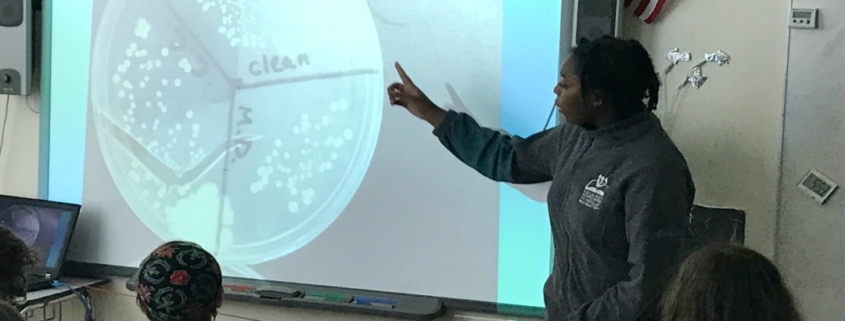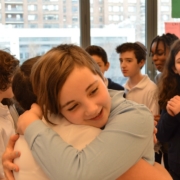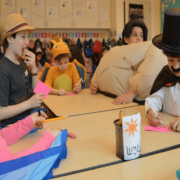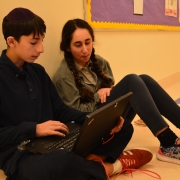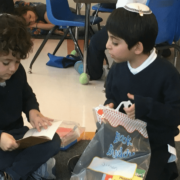09 Feb 6th Grade Science Exhibitions: The rigors and satisfaction of multi-step, long term projects
“It was gross. Really gross,” was how one 6th grade student described the growth of bacteria he had observed. He was presenting the findings of his science experiment to his peers, parents, and other members of the Schechter Manhattan community. The 6th-grade students made their science exhibition presentations this week and there was a definite “ew” factor in their research into the growth of bacteria- on bathroom sink faucets, computer trackpads, and our hands, to name a few places they reported on. The 11 and 12-year-old students were clearly interested in and entertained by their efforts as they shared photos of the bacterial growth from their various experiments.
In the 6th-grade science exhibition, students work through a full cycle of the scientific process- observing phenomenon, asking scientific questions, developing hypotheses, creating experiments to test their hypotheses, gathering data, drawing conclusions, and asking more questions for further study. Practice with scientific thinking supports development of the skills required for more advanced science study in high school and beyond.
While all the students grew bacteria and measured it, they each designed different hypotheses to be tested in their experiments, based on their own ideas and interests. Topics ranged from what type of dog toy collects more bacteria to what cleaning product, hand sanitizer or soap and water, cleans off bacteria more successfully. When students have voice and choice in their learning, they are highly motivated and engaged. That is important because completing an exhibition project is rigorous work.
At Schechter Manhattan, Middle School students complete exhibitions twice a year in each Middle School grade. Exhibitions are extended units of study in a given area that includes research, writing, and authentic presentation of learning. Students develop their ability to plan, organize, and carry out long-term projects, use judgment and make choices based on their own experiences, and demonstrate broad mastery. The multi-step and complex nature of the learning process stretches the students to new levels of achievement.
In the case of the 6th-grade science exhibition, students researched the characteristics of bacteria, generated questions for exploration, developed hypotheses to answer their questions, planned and implemented a controlled experiment to test their hypothesis, gathered data, analyzed data, drew conclusions, and presented their findings. When they started weeks ago, the students could not see clearly what they would accomplish. In the end, they presented their learning, sharing the details of their experiment, along with digital slides of bacteria samples and charts of data, and responded to unseen questions from an audience. All of this makes for a rich and rewarding learning experience, filled with moments of challenge, breakthroughs of understanding, and in the end, a meaningful sense of accomplishment.
Middle School exhibitions are an extension of the types of presentations that elementary school students complete, and elementary school students from throughout the grades came this week to attend the 6th-grade science exhibitions. When Gan students attended, they listened carefully and it was great to see a 5-year-old asking a pointed question to an 11-year-old about the results of her experiment. This models, for the younger students, the high-level work they have ahead of them and also nurtures a supportive learning community. The 6th-grade students were sent a powerful message that their hard work and achievement is valued by the other students and adults in the school. And there is nothing “gross” about that.
Shabbat Shalom
Benjamin Mann
Author’s Chair
Each week we will feature the written work of our students. We hope that you will stop back next week and see what they are writing and thinking about.
GAN
Students are working on their nonfiction books, using their passions as inspiration.
“I get a cup kak on my bthda”
(I get a cupcake on my birthday).
– Hannah
“Goglz ProoteKt your Az”
(goggles protect your eyes).
– David
“You cen Swim Wen itS suny”
(You can swim when it’s sunny).
– Arielle
KITAH BET
Kitah Bet students have finally finished learning about the 6 days of creation and Shabbat!
Students were asked to answer a thinking question about Shabbat. They chose from a number of options: regarding Shabbat’s holiness, Shabbat’s connection to Kiddush or why Shabbat received a blessing from God.
Click here to view work by, Zeva, Liat, Naomi, Nava & Bela
KITAH HEH
The fifth graders wrote opinion essays about the topic of their choice. They supported their opinions with facts, statistics, and quotes from experts.
Should school start later
When I was about to first start taking the bus , I had to get up at 5:00am in order to be able to catch the bus. When my alarm went off in the morning, I groaned. Why did school have to start when it did? If school started later, than kids would be able to get enough sleep and will still be able to get to school on time. Many people agree that kids do not get enough sleep. The cause of this is simple: school starts so early that it stops kids from getting enough sleep. I believe that school should start later than it does.
The first reason that school should start later is that kids get tired when they have to get up early for school. Teens need eight to nine hours of sleep which they are not getting. A study at Drexel University, shows that 12 to 18 of students found that “20% of those studied got the recommended eight or more hours of sleep during school nights with the rest getting less than eight hours”. 85% of Rhode Island teenagers are sleep deprived. Not only that, but 57.1% of SSSM fifth graders said that they get tired during school days. That proves that school starts so early that kids can not get enough sleep and as a result, they are getting tired during the day.
If kids are tired in school that will worsen their performance as well. Students who do not get enough sleep find it harder to focus in class. When kids do not get enough sleep, their ability to remember what they hear or read is impaired. Obviously, when kids fall asleep in class they are completely unable to learn anything. If this continues, then kids will receive a worse education than the could have. This makes it clear that schools need to start later and if they don’t, then it could ruin lives.
Not only that, but if school started later, than kids would have more freetime in the morning. The amount of playtime that children have been getting has been lessening over time. This has resulted in the rise of anxiety, depression, and problems of attention and self control. 52.4% of people in my class feel that they do not have enough free time in the morning too. So if schools do not start later than they do, than children will continue to have less freedom.
However, the other side might say that if school started later, then it would end later and that kids might get home before their parents. But these things are not true. If school started later, then students would be able to learn more in less time because they will be better rested so that school would still end at the same time. Not only that, but if parents’ jobs start later, then they will be able to get more work done in less time to and still be able to be at home before their kids.
Because schools starting when they do forces kids to get up earlier and as a result of what schools are doing, kids get tired during the day, do not learn as well as they normally would, and do not have enough free time in the morning.In conclusion, schools are preventing children from being able to function. Think about having to get up every morning at 6:00AM and being unbelievably tired, but still knowing that you have to get up for school, and will only to be able to get the right amount of sleep on two days of the week. When you see children that are so tired that they can barely function, remember how obvious it is that schools need to start later.
– Sam
Why kids should have to do chores
Emily Wiggins is an average girl in Chicago, Illinois. Every day of the week she goes to school and to church. But something is not average about Emily Wiggin’s life: her house. She walks into her house everyday watching her parents struggle to clean up the house while she watches TV. Her parents are so tired of her laziness, so when Emily asks “Can I have a dog?” her parents say “No, how can we trust you with taking care of a poor dog, when you don’t even offer to help clean up your own house!” Emily is heartbroken, she really wants a dog but she does not want to do chores. She doesn’t get why her parents want her to do work around the house.
Like many other families in the US, there is a battle between kids and adults about whether kids should have to do chores. For example, at the Solomon Schechter School of Manhattan, research has shown that 62.8% of the fifth, sixth, and seventh graders do chores and that 17.9 % of them started at age 8. Unlike Emily Wiggins, the majority of the students believe kids should have to do chores. I believe kids should have to do chores for so many reasons.
One reason for making your kids do chores is that it helps promote responsibility. According to my mom and one of my teachers at SSSM, chores are very important. My mom and my teacher both started doing chores around age 8 and they think it made a positive impact on their lives. My teacher has children, and one is a baby that is 2 years old. Of course, they are still very young and they are not old enough to start working around the house, but she is planning to give them chores to help them become responsible.
According to Deb Cohen, assistant director of the web-based Center for Parenting Education, “kids who do chores are better in all aspects of their lives.” The chores help them become more responsible. Responsibility helps kids in school and in the larger world and can boost their self confidence. In college, kids live alone and they don’t have a parent to clean up their room. If they had chores growing up, they would be able to clean it up on their own.
Another reason for making your kids do chores is that it helps prepare them for the future. Marty Rossman of the University of Minnesota has conducted a study that shows that when kids start to do chores at age 3 or 4, they are more likely going to have good relationships with family and friends, and achieve academic and early career success. This will help them to be self-sufficient, as compared with those who didn’t have chores or who started them as teens. But that is not the only reason that making your kids do chores helps prepare them for the future. Some kids who do chores get paid to do them and that helps them manage money. The future is very complicated, so prepare them for it.
The last reason is one of the most important reasons for why you should encourage your kids to do chores. Making your kids do chores has health benefits. Dr. Rian Rowles, a psychiatrist affiliated with Advocate Christ Medical Center in Oak Lawn, Illinois says that “too much clutter can cause tremendous stress and fatigue. When things take longer to find, or can’t be found, stress levels rise, and so does your risk for illness.” By doing chores kids can help get rid stress and clutter.
Chores can keep kids healthy by giving them opportunities to exercise. One of the world’s largest studies on physical activity has found that having your kids do household chores can be just as effective as running or working out when it comes to cutting your risk of heart disease and extending your life. Many kids around the world are trying to (or just need to) lose some weight. While age, and gender play a big role, it’s possible to burn anywhere from 100-300 calories per hour doing housework, and it is all depending on what type of activity, vigor, and time in which you do it.
Opponents might say kids work so hard during the day, they need time to relax. Kids go to school all the time with piles of homework. True, kids need time to relax. However I believe that kids have enough time to do chores and work around the house. Personally, I spend around an hour of homework and at least thirty minutes of chores a day. That leaves me with three hours of free time a night!
Kids should do chores for all of the benefits ahead. As I have said, chores prepare kids for the future, teach them responsibility, and have some big health benefits. These are just a three out of many more reasons why kids should have chores. If you’re a parent or are going to be, please encourage your kids to do chores. Chores are very important and beneficial and I believe kids should have to do them.
– Nina
Should kids have homework?
Teachers assign about 3.5 hours of homework every week. More than 74% of kids do not like homework and think that it is a huge interference with their free time with friends and family. The other 26% of kids like the idea of homework and think homework is good. But even though most kids don’t like homework it doesn’t mean it is not good. Kids should have homework.
One reason kids should have homework is because it teaches them responsibility and time management. According to Solomon Schechter School of Manhattan Head of School, Ben Mann, “ If I had to explain homework in 5 words I will say, hard, practice, limited, responsibility, and time. I think this because it’s hard for kids to have homework when they want to play. Also, kids need to practice their work in order to succeed. Next, homework has to be limited. Too much homework ends up giving the kid too much stress, and no homework is not very good. Then, responsibility and time because it teaches you how to manage your time.” When kids will grow they will need responsibility in order to be organized. Homework teaches you how to manage your time between free time and studying. It also teaches you how to take responsibility in making boring homework in to fun.
Another reason kids should have homework is they need to practice for all the things they have in school and in future classes and assignments In school. Doing homework will prepare students for big tests. If a child does a poor job on an assignment they will learn what is necessary to do on the next test without being punished because they don’t know how to fix what they did wrong. Like we say, practice makes perfect. Homework teaches more than what is just done in the classroom. When you bring home homework, complete it, and then turn it in, it teaches important life skills such as, responsibility and organization. Homework is practice. You don’t get good at something without practice. For example, Avia did not understand multiplication standard algorithm. She had to practice this at home to get better and better. But at home, it makes no difference! She still doesn’t get better, but there is so much more to homework then getting better on a multiplication problem. Now, Avia is 16 and she has improved on all her math tests, because of all the hard work she put in studying at home.
Lastly, kids should have homework because it allows their parents to see what their child is learning in school. Homework creates a bridge between school and home. Parents barely get to spend time seeing what you do at school. Homework allows them to keep up with what you’re doing in your classes on a daily basis. It’s good for you, too!
When your parents see what you are doing it allows you to tell them more about what you do in school with less explanation and stress. When you bring your work home you are able to not only show your parents what you are doing but you also show them what strategies you use.
85% of kids in a school SSSM think that homework interferes with all their free time and fun. It is true, but studying is more important than any playdates and going to the park, plus you have about a quarter of the year as break. Homework should always be done first before any screen times and board games. Yes you do need some free time with your family and friends but you have enough in breaks.
In conclusion, homework can help kids with all kinds of important life skills. You might think homework is the most boring thing ever, but when you grow you will realize how much it helps. Homework can guide you throughout your whole learning experience. It can teach you responsibility and it can get you to the highest grades.
KITAH ZAYIN
As part of their unit on the Circulatory System, students learned about causes and consequences of plaque build up in the arteries. They researched different devices and procedures such as balloon stents, angioplasties, and bypass surgeries. Students worked in teams to design 2 solutions to unclog or reroute blood flow in the arteries. As independent follow-up work, individual students shared about the designs and functions of their solutions..
Click here to view work by Jared
